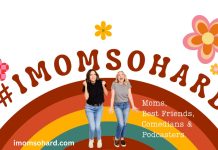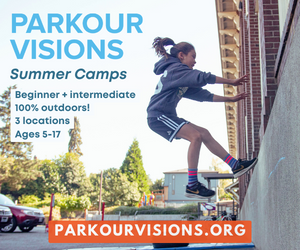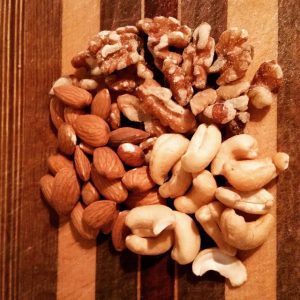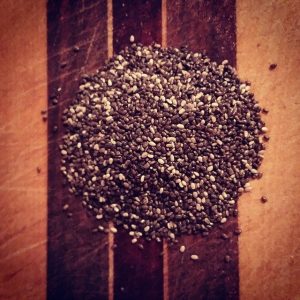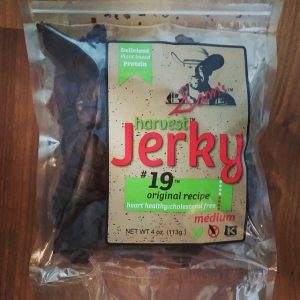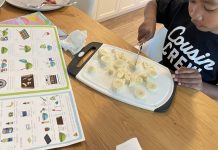“What do you eat?” It’s probably the most commonly asked question that follows once someone discovers I’m vegetarian. Mason jars filled with sprouts, trays of wheat grass, and endless bowls of salads often come to mind of those who don’t know what it means to be vegetarian. Sometimes I’m asked if I eat chicken and fish only, and while I do have fish once in a great while, any kind of animal meat is not part of the vegetarian diet.
The next question that follows often is “Where do you get your protein?” This is when I smile and say “beans.” Then pause a moment for dramatic effect before continuing with the list below. For some reason, many people who are not familiar with the vegetarian diet assume that we have such limited sources for protein or that the protein from plants isn’t as hardy or sustainable as the animal-based variety.
While my family does eat some dairy, most of our protein comes from natural plant sources, and yes it does include beans.
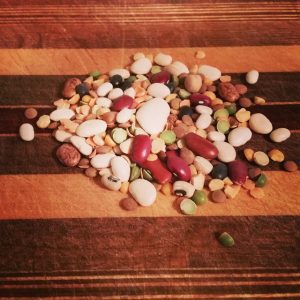
- Beans. “Beans, beans, the magical fruit. The more you eat, the more you toot…” You know that classic grade-school rhyme. Beans are packed with protein, but they don’t have to make you toot. If you soak them for at least 12 hours before cooking, enzymes are released to help the body digest the legumes better, minimizing the gas production. One cup of cooked beans contains up to 15 grams of protein. A simple pot of beans can be quite versatile for consumption. For example black beans can be used for salads, burgers, bean dip, burritos, a side dish, and soups. Another plus is beans are inexpensive, especially if you buy them in bulk and can easily feed a growing family on a budget.
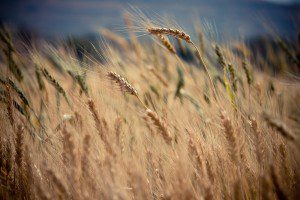
- Whole grains. Brown rice, whole wheat, barley, quinoa, amaranth, and oats are just a few grains chock-full of protein. If you make a salad with quinoa, add some beans and veggies, you’ve got a hardy meal right there.
- Nuts. I’m absolutely nuts for nut butters and milk. My favorites include cashew and almond butter. I like to add a tablespoon of nut butter or a hand full of nuts to my smoothies for extra protein and flavor. I even add it to my daughter’s oatmeal in the morning. She loves it! Not only are nuts hardy, they also contain essential fatty acids. My husband makes almond milk weekly and it’s delicious (and super easy). Soaking nuts for a couple of hours before consumption helps aid digestion. Same goes for seeds. Oregon grows many types of nuts. Check out your farmer’s market for local sources.
- Seeds. A tablespoon of chia seeds packs a whopping 5 grams of protein, not to mention lots of Omega-3s. Sunflower, flax, and sesame seeds also are loaded with goodness. I add a couple of tablespoons of chia seeds to my smoothies for extra fiber and protein.
- Soy. I know soy is a very controversial topic. There are enough studies that show both the benefits and negatives of consuming soy (although majority, in my opinion, point to the pros). I think the important factors to look at are where the soy bean is grown and whether it’s been genetically modified. One of my favorite sources comes from Butler Foods Company, based in Oregon. They make the yummiest vegetarian jerky EVER. Sam’s Harvest Jerky™ has become a staple in my home. It’s perfect for hiking, camping, snacking, or just adding to a meal. The best part, they are a local company and I actually know the owners personally. The soy beans they use are Non-GMO. Butler Foods as other products like Soy Curls™ which can be found at many of the local markets like New Seasons.
Remember most vegetables have protein in them. Kale, for example, is known to have 3 grams of protein in a cup (loosely chopped).
The best part about getting your protein from plants is that your body digests the nutrients much better than that of animal products. A plant-based diet is far more environmentally sustainable and good for the local economy. Providing nutrient-rich food for your family means healthy kids. Healthy kids mean a bright future for our planet.


